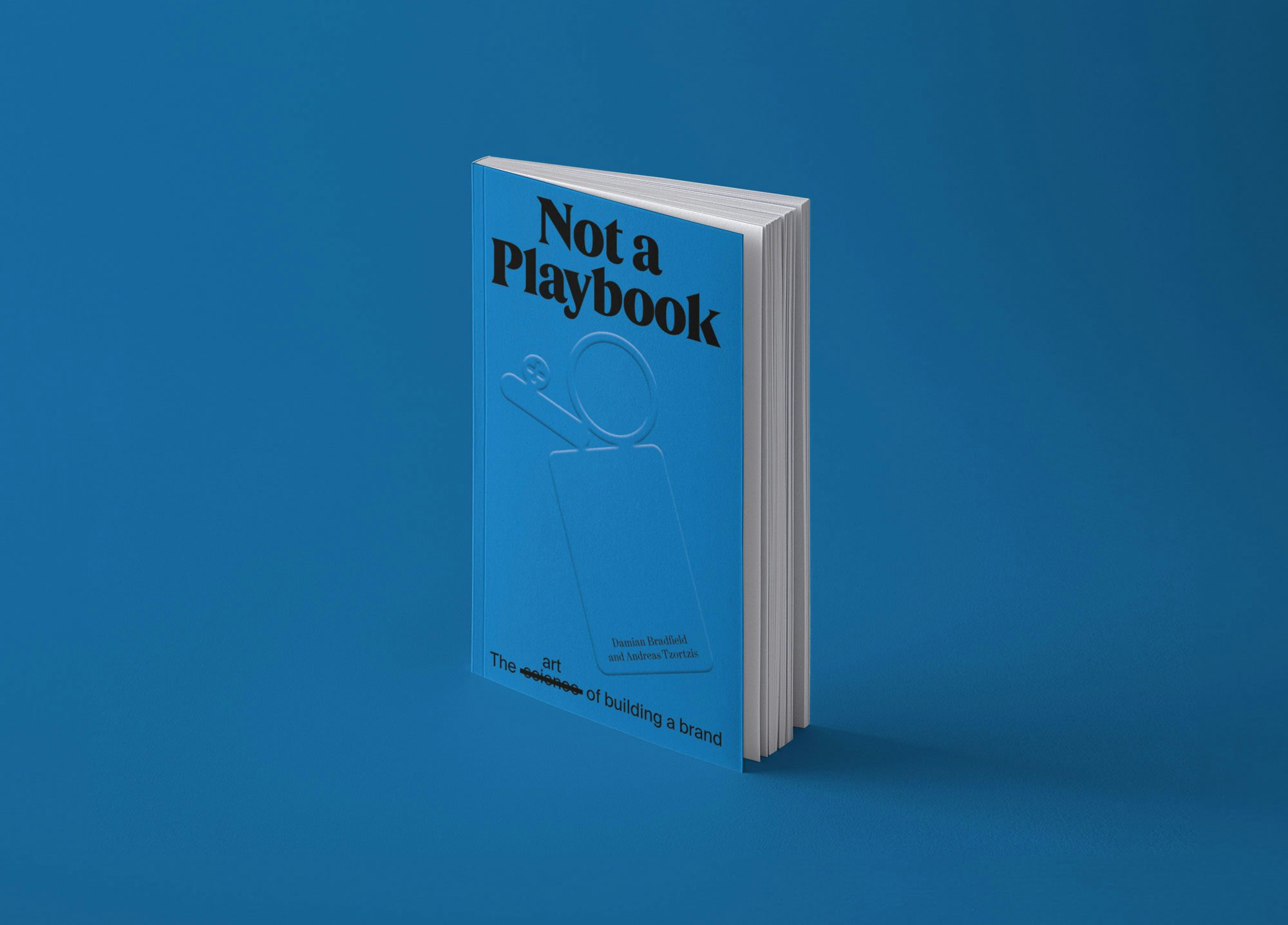WeTransfer’s Damian Bradfield on the art of building a brand
As he publishes a new book about his time at WeTransfer, Bradfield reflects on how he helped transform it from a file-sharing company into a brand beloved by the creative community, plus what other brands can learn from its example
“I find myself starting conversations at the moment with, ‘Well, if you remember back in 2009’, and some people I’m talking to literally can’t, but it was totally different,” says Damian Bradfield, WeTransfer’s co-founder and former CCO. “It was a lot of people trying to figure out what the internet meant, what you could make, and how to make it. I felt like there was huge excitement and energy, and we thought anything was possible, but had no real idea of where it was going to go because no one did.”
When CR catches up with Bradfield over Zoom from his home in Amsterdam, he is feeling reflective about the brand that he helped bring to life 15 years ago, along with fellow co-founders Nalden, Rinke Visser and Bas Beerens. It’s been over six months since WeTransfer’s widely publicised (and controversial) acquisition by Italian tech company Bending Spoons, which led to 75% of its staff being made redundant. Having exited himself at the beginning of this year, most of the co-founder’s energy has been spent on his new book, Not a Playbook, which tells the story of what he’s learned along the way.
Co-authored with strategist and writer Andreas Tzortzis, the book’s focus is on how brands can grow without sacrificing integrity, told through the lens of a file-sharing company that became a beloved brand by prioritising intuition, creativity and relationships over marketing trends and algorithms. When WeTransfer first launched in December 2009 with a simple, friendly flash site that had little more than a few lines of copy and some buttons, it felt like a breath of fresh air in the tech landscape where Bradfield recalls engineers being “the kings of the internet”.

Within three months, people in 187 countries around the world were using the platform. Within three years, it had 15 million monthly users. And today, it reaches 80 million users and more than 600,000 paying subscribers in 190 countries, as well as earning more than €100 million in annual revenue. “The head start that we had on a lot of other companies was that actually we did understand what good design looked like, and WeTransfer still to this day is one of the simplest concepts in the world,” he says.
“We weren’t holding tonnes of data, we weren’t retargeting, we weren’t playing the game of the internet, and people liked that about us. The tech press didn’t; they always called us the funky Dutch cousin to Dropbox, which annoyed the fuck out of us. But fast-forward five years and suddenly everyone had got bored with engineering stories. And actually, no one really cares what’s under the hood of the car, they care what it looks like and feels like when they drive.”
While Bradfield admits that he never set out to build a brand in the traditional sense of the word, WeTransfer’s longstanding relationship with the creative community who use its products day-to-day has played a fundamental part it how it’s perceived. From the beginning, the company famously donated 30% of its advertising real estate to promote artists, creative work and charitable causes. It’s an initiative that has added up to billions of homepage ad impressions over the last decade, while the company’s non-profit, the Supporting Act Foundation, has given away more than €1 million a year in grants to emerging artists.
This philosophy also gave birth to WeTransfer’s art-focused editorial platform WePresent, which launched in 2018 with the aim of offering the same moments of surprise and delight you’d get walking through a museum, and now reaches three million people a month. Alongside running profiles of fresh creative talent and commissioning creative projects that also appeared on the platform, its annual guest curators have ranged from Marina Abramović to Solange Knowles. Not to mention its 2022 short film with Riz Ahmed, The Long Goodbye, which earned the brand an Oscar.
“At one point, everybody was doing branded content,” says Bradfield. “Red Bull Sound Select, Sonos Studio, Converse Rubber Tracks, Intuit Mailchimp’s Courier magazine. Every brand basically had something that was toying with music, film, art, galleries, all this stuff – every single one of them has disappeared. They’ve all gone, and I’m pretty proud that WePresent is still going.”
The result was an authentic relationship between WeTransfer and the creative community. If you used it to share files over one of its competitors, chances are you were a filmmaker, photographer, musician, designer or illustrator. “My goal was that if we would support FKA twigs, or Riz, or Beyoncé, or Björk, or whoever, and they would just tell their friends we used WeTransfer without talking about it, but just use it, that is the best brand advocacy you can have. I thought we should spend all of our money trying to be the friend of the artists, the artist’s artist, as opposed to a brand buying artist relationships that are not relationships, they’re transactions,” he adds.
There’s this is arrogance I think today that, if you start a company in January, by December you can start calling yourself a brand. I don’t think you have that right
Reflecting on WeTransfer’s acquisition by Bending Spoons last year, which has a reputation for making mass redundancies at the companies it acquires, it’s clear that Bradfield still has mixed feelings about how it unfolded. “I would never say that Bending Spoons was my dream exit. I would have loved to have IPO’d, I would love to have sold to a private family office, or even found a way of giving it back to the community. That didn’t happen,” he says. “At the end of the day, I didn’t have a voice in whether or not we were sold. We had majority shareholders, they decided they wanted their money back. It was a decision that we actually made the minute that we took investment in 2015, but I didn’t really understand I think.”
Having said that, Bradfield’s two key asks during the acquisition – to continue funding the Supporting Act Foundation for the next three years and that WePresent remains intact for the foreseeable future – were both honoured. “Bending Spoons is what it is, it buys companies, it picks them up, turns them around. I have to say they’re at least straight up and direct and honest. That’s not the same as me saying I like private equity, but I do actually feel I know where I stand with them and I feel like in politics and life today, that’s a rarity,” he adds.
Asked what life looks like for him post-WeTransfer, Bradfield notes that in the process of putting together Not a Playbook he realised it would be better to self-publish rather than going down the traditional publishing route. This realisation led him down the rabbit hole of the publishing industry, resulting in him launching his own imprint Fude. As well as releasing his latest publication, he also plans to re-publish several of his previous books and a series of works by other writers and artists, including an illustrated children’s book and an audio book with Stephen Fry and Geraldine James.

“The publishing industry is really in a state of flux, and certainly for young writers it just doesn’t make sense,” he says. “This is the same as the music industry; if the publishers weren’t so greedy it could make sense, but the terms that you get are just ludicrous. It works for Waterstones, it just doesn’t work for anybody else down the food chain, particularly the writer. So that was the project, can I make it work? And if I can make it work for myself and do it relatively simply, then I can probably make it work for somebody else.”
As for what he’s learned over the last 15 years about the art of brand building, Bradfield believes that the days of aspiring to be a mega-brand – on the same level as the likes of Coca-Cola, Heineken and BMW – are long gone. “I just don’t think you’ll ever win based on the way that awareness is built and bought today. That game changed, SEO changed everything, and the internet doesn’t forget, so they will always be up there as top of mind.”
He also notes that, in part down to the at-times-overwhelming level of conversation around brand these days, the true meaning of the word has been wrongly reduced to little more than a name and a logo. “There’s this arrogance I think today that, if you start a company in January, by December you can start calling yourself a brand. I don’t think you have that right. I think it takes a certain amount of time and effort before you get the right to be able to say that.”
What truly transforms a business into a brand then, is building an emotional connection with the customer, and the way you do that is through people. “People don’t buy into brands, they buy into people,” says Bradfield. “The reason that we love Patagonia is because of Yves, the founder. The reason we love Ben and Jerry’s is because of Ben and Jerry. The reason we love Margiela is because of Martin Margiela. And maybe the thing that I took most from WeTransfer was that actually, a brand doesn’t exist without great people that care, that really want to do great work, and that other people resonate with.”

Not a Playbook: The Art of Building a Brand is published by Fupe; damianbradfield.com




